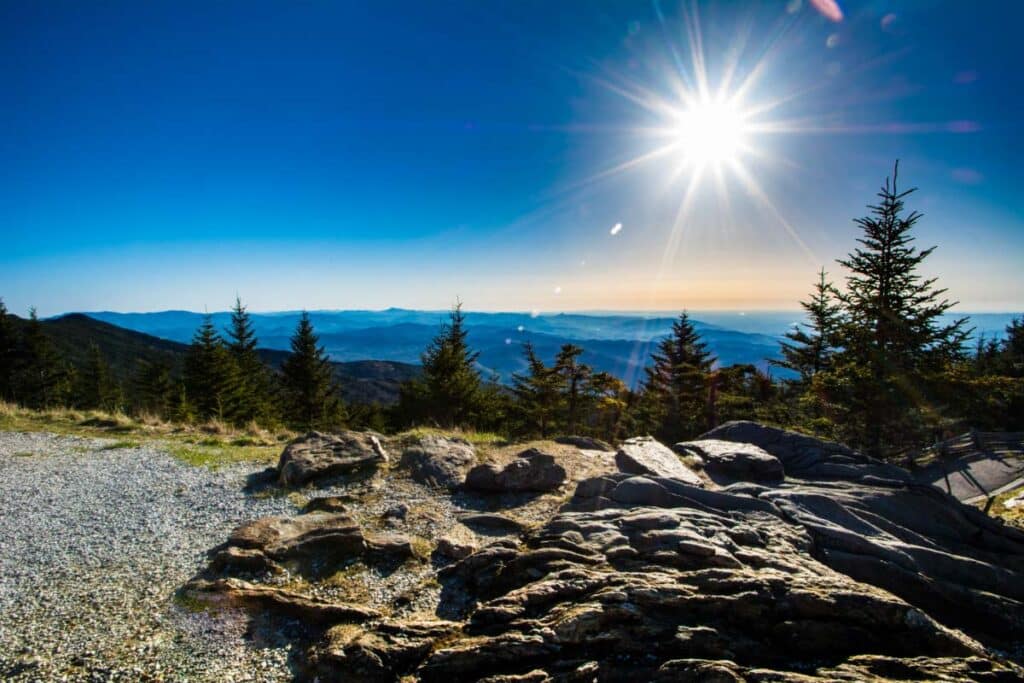Asheville, a small, vibrant city in the North Carolina Mountains, draws retirees in for its reasonable cost of living, cutting-edge programs for active seniors, and sophistication. In early 2020, Forbes Magazine named it among The Best Places to Retire, and by November, Money.com included the city in The 10 Best Places to Retire in America.
But like any other retirement destination, Asheville has its perks and downsides. What are the pros and cons of retiring in Asheville?
Asheville has comfortable summers and mild winters. It offers mountain vista backdrops and educational journeys for retirees. However, retiring within the city limits means a high cost of living, steep rents, and congested traffic.
This article covers more than just the pros and cons of retiring in Asheville. Included are quick facts about the city, what to expect, and moving around Asheville. Read on to learn where most retirees live, affordable places to live, and some helpful services tailored fit for seniors.

A Quick View on Asheville, North Carolina
- Mixed demographic of retirees, college students, young families, and all-age professionals
- Major industries are manufacturing, tourism, and healthcare.
- The downtown area has a theater, a cultural center, and museums.
- Galleries and shops showcase region-created arts and crafts.
- Mountain crafts at the Folk Arts Center (Blue Ridge Parkway)
- North Carolina Center for Creative Retirement (classes for seniors)
- Memorial Day Creative Retirement Exploration Weekend (workshops for seniors on multi-faceted factors of relocating)
- 7% sales tax exemption on services and prescriptions
- $20,000 permanent home exemption or 50% off your permanent home’s assessed value (seniors aged 65 and above with a combined annual income less than $19,700)
- Five hospitals with over 500 doctors
- Healthcare services include trauma, emergency air transport by helicopter, and heart and cancer centers.
Find out what the city of Asheville is know for in this article.
What Are Winters Like In Asheville, NC?
Asheville receives an average of one or two snowfalls in winter, so snow barely piles up to a foot. Nonetheless, it’s enough to enjoy snowy activities like sledding. There are also several ski resorts to choose from.
Mountains surround the city, so major snowfalls are seldom. During significant snowstorms, though, schools and some workplaces are closed. High elevations like ski areas get an average of more than 80 inches of snow during winter.
January to March are the slowest months with fewer tourists, so they are great months to visit.
Find out more about winter in North Carolina.
What Is It Like Retiring In Asheville, NC?
Expect more than 200 days of sun every year when you retire in Asheville. You’d be co-inhabiting with around 94,000 people, 35% of which are 50 years old and above.
Purchasing a home is pegged at an average of $330,000. The Biltmore House, US’ largest privately-owned home, is somewhat pricey, but there are basic needs that are relatively low. Tastee Diner’s hamburger only costs $5, and bus fares for seniors only cost $0.50. You can also have an annual pass for only $110.
When you retire in Asheville, you’re close to nature, like the Great Smoky Mountains National Park. But the city also has the highest number of bars and restaurants to explore, landing Asheville a spot in The Daily Meal’s 2019 List of Top Foodie Towns in America.
Getting In and Out of Asheville
If you have family and friends living in other parts of the country, the Asheville Airport offers nonstop flights to places like Denver, New York, and Florida cities. Fares out of Asheville are also comparatively priced.
If people want to visit you by car, it’s also quite easy to get to Asheville. Whether they’re coming from Greenville, SC, or Miami, FL, travel time ranges from an hour to less than half a day.
Retirement Communities In Asheville
Asheville offers different types of retirement communities, including:
- Gated communities
- Townhomes or Condominiums
- 55+ neighborhoods
View some of the best 55+ communities in Asheville.
Pros and Cons of Retiring in Asheville, NC

Pros
Is Asheville a good place to retire? Yes, and here are some of the top reasons.
Favorable Climate
Asheville is a city of all four seasons, but scorching summers and winter blizzards aren’t part of the deal. The summer heat barely reaches 90 degrees, and with an elevation of around 2,000 feet, only a small amount of snowfall visits during wintertime.
Spring (late March to mid-May) has warm days and cool nights. Mid-June evenings are light-jacket cool, while fall offers cooler days. Autumn is great for outdoor activities, leisure drives, and outdoor dining.
Sceneries
Besides fantastic mountain vistas, national forests, and state parks, Asheville is famous for its blue-toned mountains like the Blue Ridge Mountains. Bring out your Point & Shoot Digital Camera (view on Amazon) and capture the kaleidoscopic colors of the city’s foliage in the fall months or explore scenic landscapes along miles of hiking trails.
Hike, camp, or ride your bike at The Pisgah National Forest, surrounded by wooded forests and lush mountain valleys. Be amazed by cascading waterfalls or indulge in fishing in the city’s rivers and lakes.
Art, Food, and Drink
Asheville’s art scene comes alive when local artists perform in venues like the Wortham Center for the Performing Arts or artisans showcase their unique craftworks in art galleries and museums.
Dining in Asheville is an art on its own, from the Spanish-inspired restaurant Curate to Plant’s vegan menu. In-between palate choices include southern favorites like the Eastern Carolina-style barbeque at Buxton Hall and All Souls Pizza’s famous Italian delight. City food with a southern charm has:
- Biryani, grits, and barbecue
- Fried okra, sushi, and tapas
- Pakoras and Vegetarian Reubens
- Gravy-smothered southern biscuits
For your drinking pleasure, The Highland Brewing Company, Asheville’s oldest craft brewery, entertains with live music. And just across the French Broad River is another popular spot, the New Belgium Brewing Company. Asheville is also a beer mecca, with strong local vineyards and hard-cider distilleries.
Educational Journey for Retirees
Is Asheville a good place to retire? Yes, particularly if continuing your learning is in your life plan. The Osher Lifelong Learning Institute offers educational programs designed for seniors. From lectures to art and music performances, you embark on a learning journey in and outside the campus.
Outdoor Activities
Asheville is among the favorites when it comes to outdoor adventures. Whether you prefer laid-back hiking and mountain biking or adventurous kayaking and whitewater rafting with your new lifejacket (view on Amazon), Asheville is a mecca for anything outdoorsy.
Healthcare
Asheville is home to many excellent healthcare practitioners who live and work in the city. There are a variety of hospitals and outpatient clinics, and 20% of the city’s workforce is in healthcare.
Mission Hospital at the heart of Asheville ranked high in the US News and World Report’s North Carolina hospital ranking from 2017 to 2019. It’s also among the Top 50 Cardiovascular Hospitals according to IBM WatsonHealth.
If you’re a veteran, Charges George VA Medical Center in East Asheville is among the Top VA Hospitals in the US and ranked second among 130 acute care VA hospitals.
People and Neighborhood
Residents of Asheville are very friendly and helpful. There are great dining options, coffee shops, and cafes. With lush mountains surrounding the city, fresh air is abundant. The downtown area is perfect for leisurely strolls.
Cons

The following factors make retiring in Asheville less conducive.
Housing Market
While retiring in Asheville towns is financially reasonable, rents are high within the city limits.
New-Age Living
Some claim that Asheville’s core area has been veering toward the younger crowd.
Employment Opportunity
There aren’t many jobs that pay substantially.
Traffic
As a small city, its infrastructure hasn’t kept up with the influx of transplants. With no new roads to accommodate them, downtown traffic and parking become challenging. Congested areas include:
- Tunnel Road
- Patton Avenue in West Asheville
- Biltmore/Hendersonville Road in Biltmore Village
- Areas around Bowen Bridge, Long Shoals Road, and Airport Road
Social Class Gap
The middle class barely exists in Asheville. There are wealthy people and those living on day-to-day paychecks.
Cost of Living
In recent years, the cost of living in Asheville has skyrocketed, particularly in tourist rental house areas and direct oceanfront properties.
Blue Laws
You can’t buy beer and wine from 2 am to 7 am. On Sundays, you have to wait until the afternoon. If you live out of state, you can only purchase distilled spirits at Alcoholic Beverage Control (ABC) stores.
Where Do Most Retirees Live In Asheville, NC?
Asheville is a great place to retire, with many locations to choose from, so we narrowed down the list. The following towns and neighborhoods are home to many retirees.
Walk-to-Town Areas
- Black Mountain
- High Vista Falls
- Weaverville
- Biltmore Park
Amenity-rich and Rural Communities
- Biltmore Lake
- ViewPointe
- Sovereign Oaks
- Thorns Estates
Historic Roanoke Island
- Manteo
- Wanchese
- Manns Harbor
Harbor Access
- Collington Island
Services For Seniors In Asheville
Apart from scenic backdrops and exciting destinations to explore, Asheville offers helpful resources distinctly designed for retirees.
- Alzheimer’s Association (caregiver support groups meet three times a month)
- Memory Cafe (The First Baptist Church hosts every third Thursday)
- Senior Opportunity Center (programs, events, meals, and trips)
- Project CARE (provides specially trained senior advisors to families caring for loved ones with memory challenges)
- Meals on Wheels (over 500 local seniors receive meals on weekdays)
- Senior Community Services Employment Program (for eligible 55+ seniors looking to learn new skills)
- Asheville Community Yoga (classes throughout the week)
- Multiple Library Branches (audiobooks, music, movies, and book club discussions)
Affordable Places To Live Near Asheville
Here are some of the places near Asheville that are worth house hunting at.
| Towns | Median Home Value | Median Monthly Rent |
|---|---|---|
| Tusculum | $174k | $800 |
| Canton | $178.3k | $1,200 |
| Hot Springs | $178k | $1,200 |
| Columbus | $224.9k | $1,400 |
| Morganton | $141k | $1,100 |
| Franklin | $170k | $1,250 |
| Bryson City | $174.7k | $1,200 |
| Sylva | $190.5k | $1k |
| Greeneville | $113k | $800 |
Also, view our list of the 20 best places to retire in North Carolina.
Conclusion: Is Asheville a Good Place to Retire? Pros & Cons
Asheville offers the best of both worlds – great urban amenities and an eclectic mountainous backdrop. For retirees aspiring for a life milestone filled with excitement and adventures, these elements are salient points when looking for a place to retire. But retiring in Asheville also means a high cost of living, heavy traffic, and restricting blue laws.
This article features the perks and downsides of retiring in Asheville, including factors that may or may not sway you into spending your golden years in the city. Tally these factors up against your interests, priorities, and preferences. Because in the end, it’s what you want that matters most.
